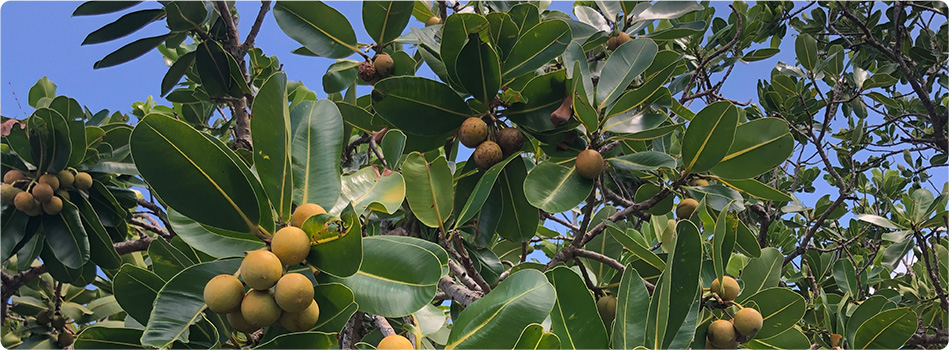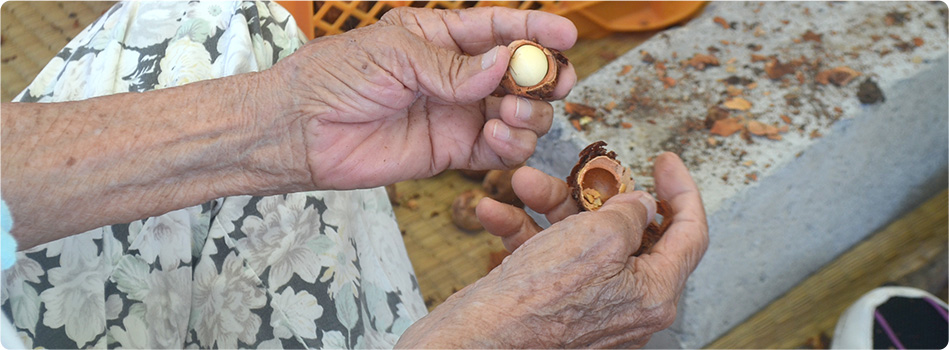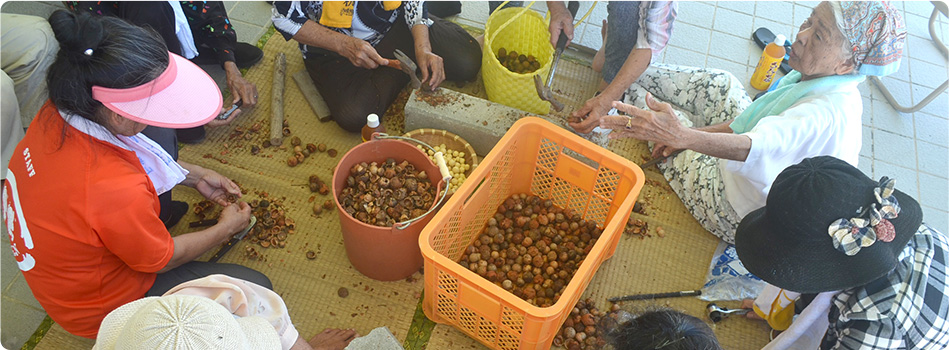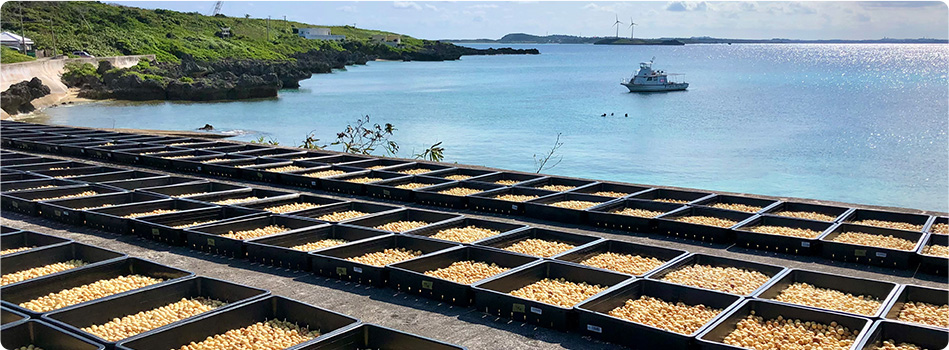by Sarah Bijlsma
In order to make tamanu oil, you first need a tree known as penaga laut or nyamplung (Calophyllum inophyllum) or terihaboku in Japanese. In the local dialect of Ikema-jima, a small island just off the coast of Miyako, this tree is called yarab. The local population of Ikema-jima has been planting yarab trees since the times of the Ryūkyū Kingdom on shores and around agricultural fields. Together with the lower adan tree (Pandanus odoratissimus), these lines of vegetation serve as windbreaks against the strong northern winds that come from the ocean. As such, they protect crops from damage by outside forces, while simultaneously preventing ki (energy) to flow out of the island.

Copyright © Tomoko Miwa 2020
Yarab trees bloom in the spring and fall and often bear fruit throughout the year. The fruits are round and a few centimeters in size, have a greyish green color and pungent taste. While humans generally do not consume the fruits, the bats on Ikema-jima are fond of them. At night, they pick them from the trees and eat the pulp with their small teeth. The seed inside the fruit is too hard to eat and hence dropped. Bats only eat those fruits that are free from chemicals; finding yarab seeds on the ground is a sign that no pesticides are used.
The local population celebrates yarab trees as symbols of fertility and scolds them for the many seeds and fruits that are lying around everywhere. Yet, recently the Ikema residents began to view them from a new perspective. After working for seven years for the Ikema Welfare Support Center (Ikema fukushi shien sentaa), Kanagawa-born Tomoko Miwa realized that creating jobs for the island’s children in the future would help Ikema island the most. Together with her husband she started Yarabu Tree, a small company that plants yarab trees and produces tamanu oil from their seeds.

Copyright © Tomoko Miwa 2018
A first step in the oil production process is to go out and collect the seeds. In this, Tomoko and her husband are helped by Ikema’s obaa-san and ojii-san. At that point, the seeds are still wrapped in a hard brown shell that needs to be cracked with a hammer or nutcracker—another job for the elderly islanders. Tomoko explains to me that planting yarab trees helps against soil erosion, but the oil production process also enhances the social relationships between the islanders. “There are of course people who are not able to receive salaries like we do, who are disabled, or who cannot live a normal life for any other reason. These individuals quickly withdraw from [social life on] the island” [1]. An example are the many old men on Ikema-jima who develop drinking issues. Without having anything better to do, they start early in the morning, and just wait until the evening comes, drinking by themselves. “Our idea was that with Yarabu Tree, these people can get a job that they can do anytime anywhere, in their own pace, with people they like […]. Bit by bit, we touched upon different kinds of people and while we had never imagined that before, these people built relationships with one another. Of course, they receive money because that is important too, but what surprised us the most is how the relationship between the people on the island is changing gradually” [2].

Copyright © Tomoko Miwa 2020
After the shells are removed, the seeds are washed and dried in the sun. This process can take up to three months. Tomoko has tried to dry the seeds mechanically but concluded that much of the natural resin is lost in that way. When it is time, the seeds are turned into tamanu oil by using cold-pressing techniques. The oil is sold pure, as body oil, or mixed with the flowers of shell ginger (Alpinia zerumbet). The Yarabu Forest that Tomoko and her husband began will be turned into a commons when fully grown. In this way, everyone on the island can go and collect the seeds, crack the shells, and produce the oil by themselves.

Copyright © Tomoko Miwa 2020
Tamanu oil is a product of multi-species collaboration and co-habitation. Tree, bat, and human work together to secure each other’s livelihoods. “[When I first told the obaa-san and ojii-san about my plans], they were like, ‘that is definitely impossible! Those fallen things, let’s just throw them with the garbage’” [3]. Tomoko laughs and says that the locals still can hardly believe that people in big cities actually buy the product. This illustrates how tamanu oil creates a bridge between Ikema-jima’s local traditions and people in Japanese metropoles who support the island through buying the products. Tamanu oil also connects Miyako’s long-term residents and newcomers. “I think that you heard this as well, but it is true that the people who migrated [to the Miyako Islands] and the people from here usually do not have so much contact with one another. They have separate communities, and the migrants are not so interested or involved with the islanders, I believe. But the tamanu oil that we produce is made by the elderly of the island, you know. […] And the migrants are very interested in [the oil], which means that there is a connection after all, I think” [3].
[1] Interview with Tomoko Miwa, 23 March 2022.
[2] Interview with Tomoko Miwa, 23 March 2022.
[3] Interview with Tomoko Miwa, 23 March 2022.
[4] Interview with Tomoko Miwa, 23 March 2022.
